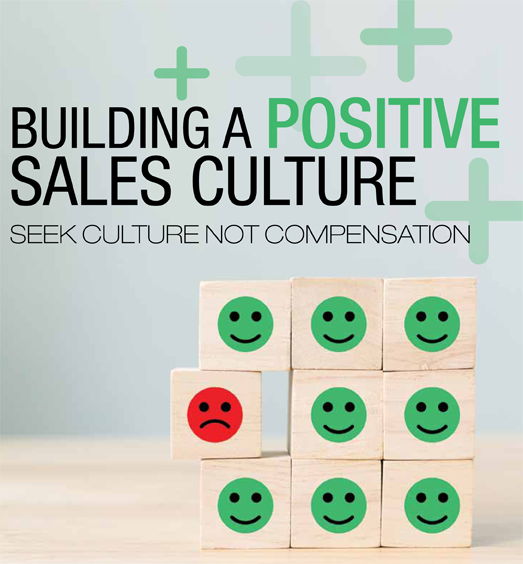Building a positive sales culture

By Troy Harrison
I’ve written a lot about how to build a “sales culture,” which is the idea, throughout your company, that you are first and foremost a sales organization. This only makes sense, because if any company doesn’t sell, no one in the company has any work to do. That’s the macro level – the look from the corner office over the entire company.
Let’s go down one level, then, and talk about the micro level – the culture within the sales team itself. You can do the best job of building a macro sales culture and still fail and have a toxic sales culture on the micro level.
The sales culture within the sales force is determined by management attitudes, the mix of personalities, leadership, policies and principles. Essentially, the difference between a toxic culture and a positive culture is this: A toxic culture is one where your people don’t enjoy their work; a positive one is one where they do. Here’s how we can build a positive culture in a few steps:
Seek Culture, Not Compensation
If the Beatles were so rich, why did they still break up? The answer is, because they didn’t enjoy being the Beatles anymore, and even the money wasn’t enough to get them to keep being the Beatles. Think about it – what would a Beatles reunion in, say, 1979, have been worth financially? I remember some monstrous numbers talked about even into the ’90s, with Julian Lennon taking the place of his dad. And yet, it never happened.
It never happened because money didn’t motivate them at that point. That happens with salespeople, too. Good salespeople must be engaged employees. That means they must love the profession of selling (the activities, not just the result), they must love what they are selling (your products), and they must love who they are selling it for (you). Enough money can overcome any of these three factors – for a while. However, there will be a point on the curve where even huge amounts of money aren’t enough to get them to keep doing what they’re doing.
Don’t get me wrong. Salespeople should be paid very well for what they’re doing – but never assume that the money will overcome a culture that isn’t supportive, positive, and fun for them to be a part of. Good sales cultures respect each individual member of the team and their contributions. Good sales cultures seek to develop and maximize talents. And good sales cultures create an environment that people want to be a part of.
Build Competition that is Collaborative, Not Cutthroat
Most salespeople have a competitive impulse. Channeled correctly, that can drive performance and results ever higher; channeled badly, that can be disastrous and result in high turnover and a toxic culture. Think of your competitive atmosphere like a bowling team. On a bowling team, each member wants to have the highest score in any game, but they also want everyone on the team to perform well so that they can beat the other team.
A good sales team works the same way – everyone wants the entire team to do well, because there are no consequences to any member for the other guy doing well. I once talked to a vice president of sales for a national company who told me that he directed each of his branch sales managers to fire their bottom person at the end of the year; that was the best way to both motivate salespeople and make their sales teams better. Not surprisingly, this company’s turnover was high.
His idea was that, since no one wanted to be the bottom person, everyone would perform their best. The problem with that thought is that there are two ways not to be the bottom person. One is to push your own performance higher. The other is to attempt to push the other guy’s performance down by working on his mindset. I’ve seen it before. It’s like the old saying when two guys are running away from a bear and one says, “I don’t have to outrun the bear – I only have to outrun you!” This kind of management philosophy always leads to high turnover and lower performance.
Your ideal sales team should be one where each member feels good about asking for help – from management and even from other team members. I have managed several sales teams that worked this way, and it’s fun. You get to hear stories about how the top team members are calling struggling ones at night to offer help and pep talks. Not surprisingly, these teams also perform the highest overall.
Select the Right Personalities
To make all of this work, it takes the right mix of personalities. That means being a little strategic about how you hire and getting a good mix. Sometimes you’ll want to hire to complement and build upon existing personalities on your team; other times, you’ll want to hire to offset characteristics in your team. But think about your personality mix and go beyond simply hiring for sales skills and qualifications.
Also, hire people who are what I call good company citizens. That means that they naturally treat everyone well, inside and outside the company. Some salespeople can, unfortunately, be denigrating to those support staff that they see as beneath them. Don’t hire these people. No matter how good their performance is, they aren’t worth the trouble and the negative effect on everyone else’s performance that they can cause.
What you need to remember in building a positive sales culture is this: The way you treat your salespeople will be reflected in the way they treat their customers. Choose your culture, your managers and your team members wisely.
 Troy Harrison is the author of “Sell Like You Mean It!”, “The Pocket Sales Manager,” and a speaker, consultant and sales navigator. He helps companies build more profitable and productive sales forces. To schedule a free 45-minute sales strategy review, call (913) 645-3603, email Troy@TroyHarrison.com or visit www.TroyHarrison.com.
Troy Harrison is the author of “Sell Like You Mean It!”, “The Pocket Sales Manager,” and a speaker, consultant and sales navigator. He helps companies build more profitable and productive sales forces. To schedule a free 45-minute sales strategy review, call (913) 645-3603, email Troy@TroyHarrison.com or visit www.TroyHarrison.com.
This article originally appeared in the May/June 2019 issue of Industrial Supply magazine. Copyright 20198, Direct Business Media.













